

A counter-productive WikiLeak. Bernd Debusmann is a Reuters columnist.
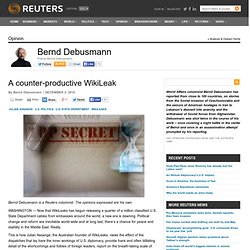
The opinions expressed are his own. WASHINGTON — Now that WikiLeaks has begun releasing a quarter of a million classified U.S. State Department cables from embassies around the world, a new era is dawning. Political change and reform are inevitable world-wide and at long last, there’s a chance for peace and stability in the Middle East. Really. This is how Julian Assange, the Australian founder of WikiLeaks, views the effect of the dispatches that lay bare the inner workings of U.S. diplomacy, provide frank and often titillating detail of the shortcomings and foibles of foreign leaders, report on the breath-taking scale of corruption in such places as Afghanistan and Russia, and note that — surprise, surprise — Arab leaders in particular tend to say one thing in public and quite another in private.
The Frequently Asked Question section of the WikiLeaks website explains why things are looking up for Middle East peace. Reporters Sans Frontières - Open letter to Wikileaks founder Julian Assange: ‘‘A bad precedent for the Internet's future'' Julian Assange Founder Wikileaks Dear Mr.
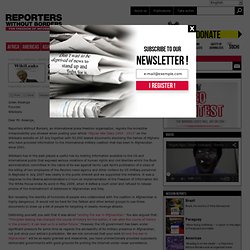
Assange, Reporters Without Borders, an international press freedom organisation, regrets the incredible irresponsibility you showed when posting your article “Afghan War Diary 2004 - 2010” on the Wikileaks website on 25 July together with 92,000 leaked documents disclosing the names of Afghans who have provided information to the international military coalition that has been in Afghanistan since 2001. Wikileaks has in the past played a useful role by making information available to the US and international public that exposed serious violations of human rights and civil liberties which the Bush administration committed in the name of its war against terror. Last April’s publication of a video of the killing of two employees of the Reuters news agency and other civilians by US military personnel in Baghdad in July 2007 was clearly in the public interest and we supported this initiative. We look forward to your reply, Sincerely, 12 Theses on Wikileaks. These 0.
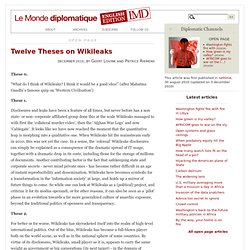
“What do I think of Wikileaks? I think it would be a good idea!” (after Mahatma Gandhi’s famous quip on ’Western Civilisation’) These 1. Disclosures and leaks have been a feature of all times, but never before has a non state- or non- corporate affiliated group done this at the scale Wikileaks managed to with first the ‘collateral murder video’, then the ‘Afghan War Logs’ and now ‘Cablegate’. These 2. For better or for worse, Wikileaks has skyrocketed itself into the realm of high-level international politics. These 3. Cult of transparency. Iceland-based Wikileaks is in the middle of “the largest intelligence leak in history.”
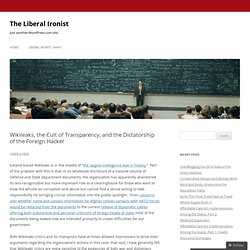
Part of the problem with this is that, in its wholesale disclosure of a massive volume of Defense and State Department documents, the organization has apparently abandoned its less-recognizable but more-important role as a clearinghouse for those who want to blow the whistle on corruption and abuse but cannot find a venue willing to take responsibility for bringing crucial information into the public spotlight. From concerns over whether name and contact information for Afghan civilian contacts with NATO forces would be redacted from the documents to the current release of diplomatic cables offering both substantive and personal criticisms of foreign heads of state, most of the documents being leaked now are intended primarily to create difficulties for our government.
This will also inevitably undermine good journalism in the future–as well as academic history. Like this: Like Loading... WikiLeaks just made the world more repressive. I am an aid worker, the kind who rants about transparency, open governments and reforming the United Nations.
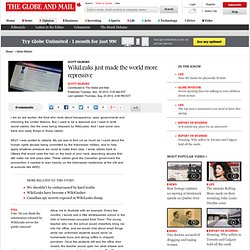
But, I used to be a diplomat and I used to write secret cables, like the ones being released by WikiLeaks. And I said some very frank and nasty things in those cables. Why? I was posted to Jakarta. My job was to find out as much as I could about the human rights abuses being committed by the Indonesian military, and to help apply whatever pressure we could to make them stop. Allow me to illustrate with an example. When we sent the reporting cables back to the Department of Foreign Affairs, they were secret for a reason. The third most common topic in the WikiLeaks cables is human rights, with American diplomats doing the same thing we were trying to do in Indonesia: Make the world a little better. That's hard to swallow for the cyber mob that is celebrating the embarrassment being inflicted on the U.S. government this week.